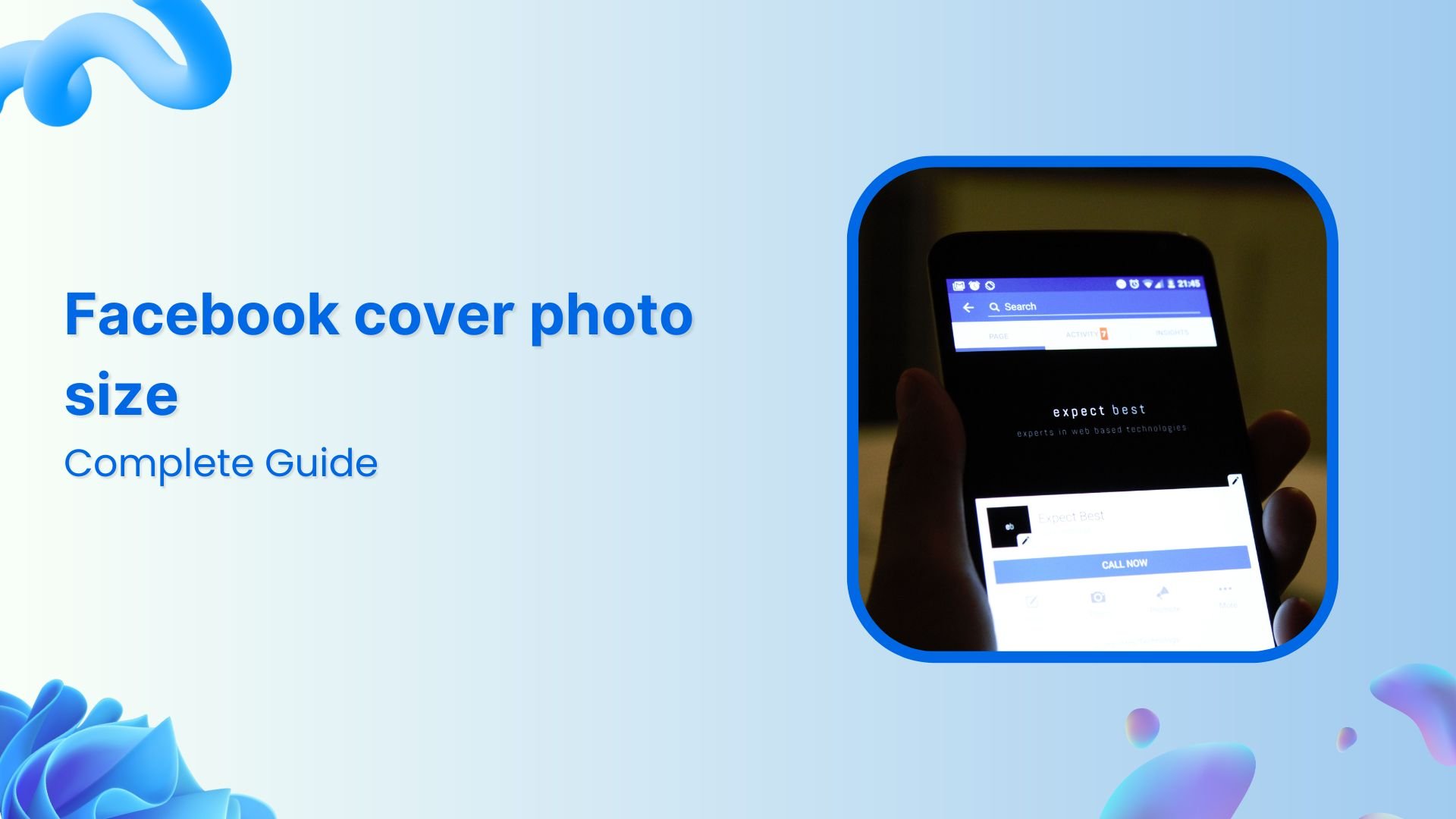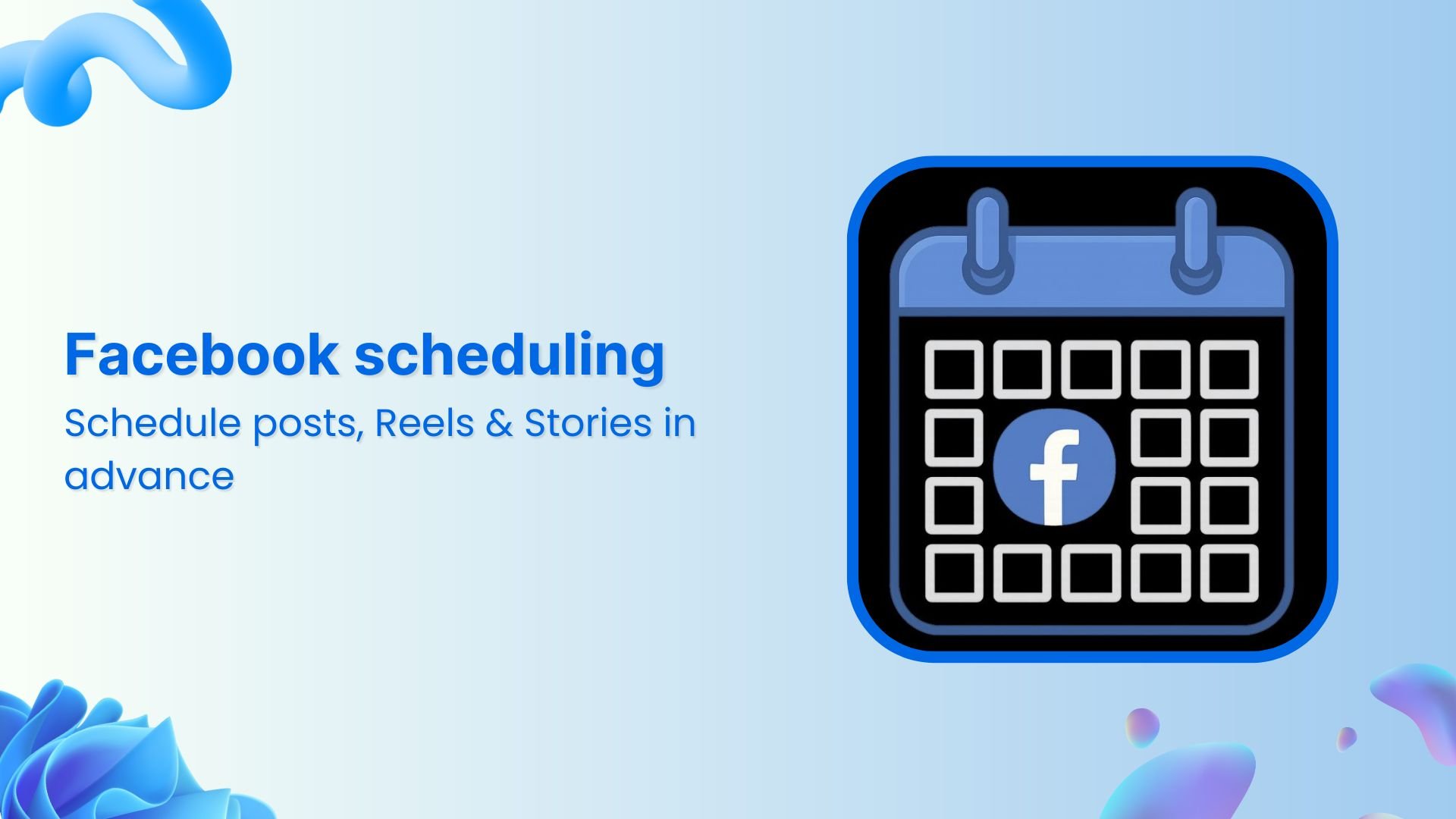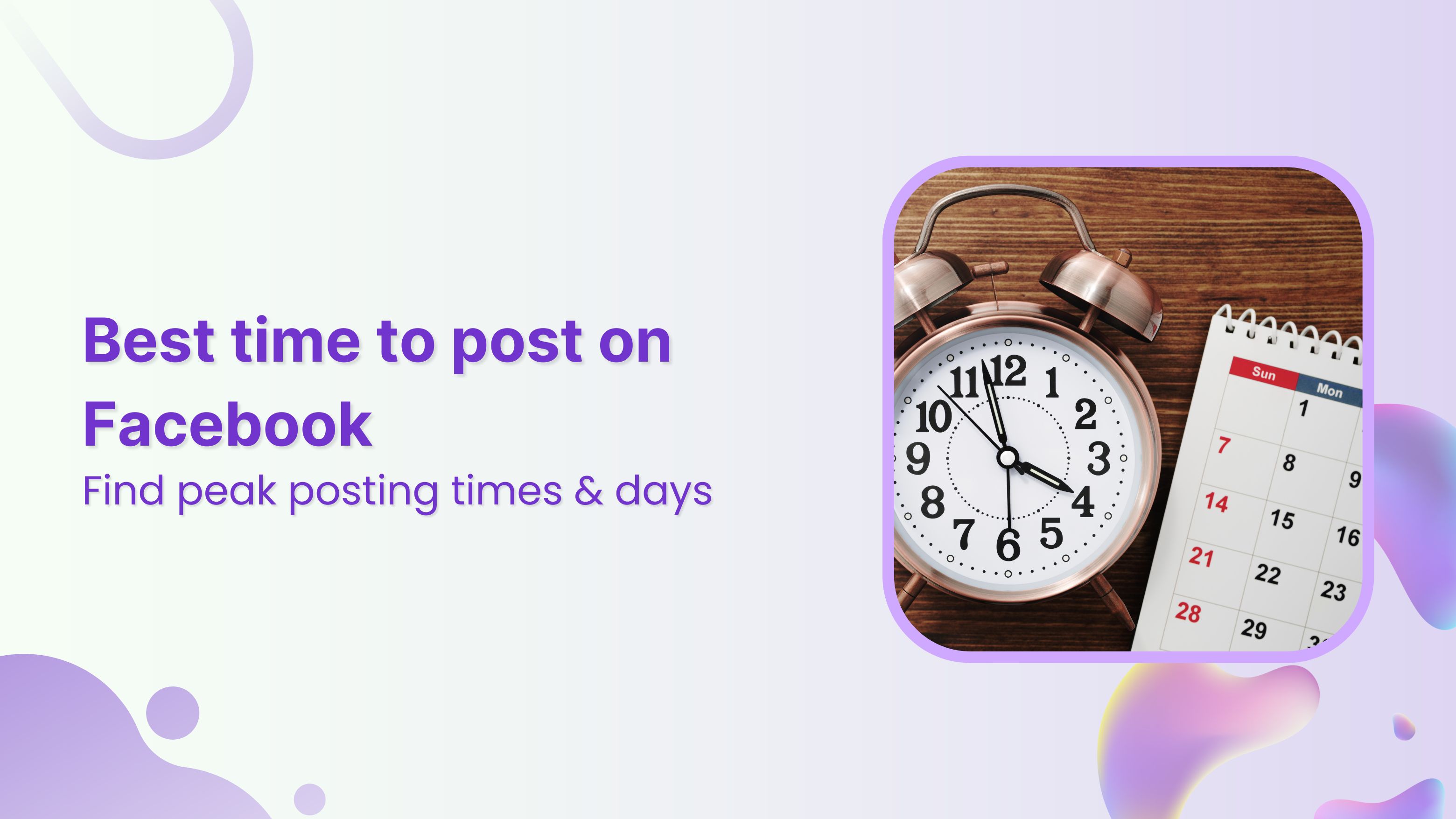Bulk-generate & schedule posts in seconds with Smart Scheduling. Try now!
How to seamlessly manage multiple Facebook accounts
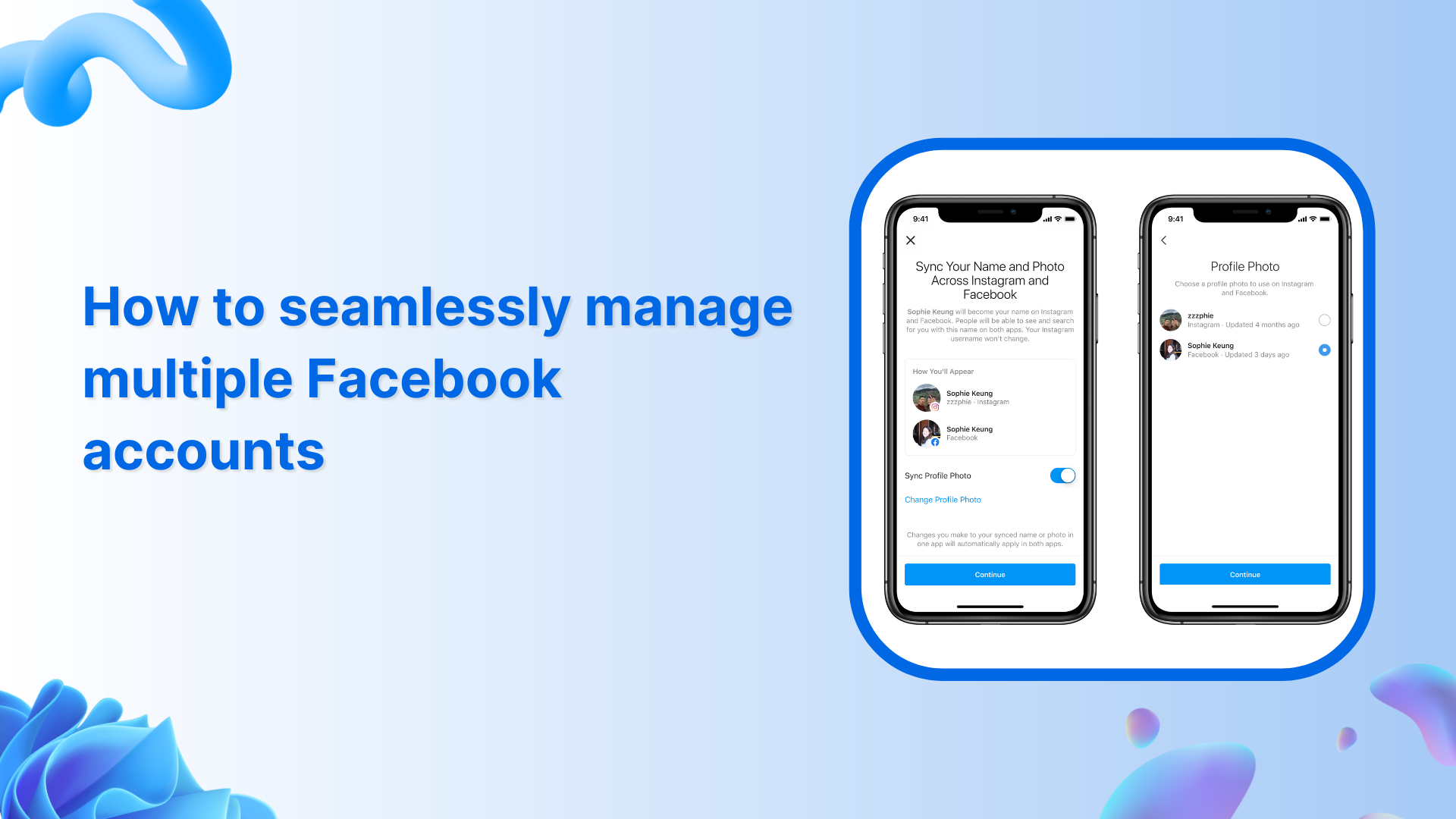
Facebook is the top-tier social media network with over 3 billion monthly active users. Roughly three out of seven people on earth have Facebook accounts, so every marketer wants to build an audience on Facebook.
While the majority of social media users have Facebook accounts, some run multiple accounts for various reasons. Multiple Facebook accounts are usually created to separate personal and work stuff, but that’s not the only reason.
Some multiple Facebook account users manage Facebook accounts or pages for clients, whereas others create separate accounts for families or pets.
However, managing multiple Facebook accounts is quite the job. Let’s find out how to flawlessly manage a bunch of Facebook accounts without losing your mind.
Facebook Marketing
Manage and grow your brand on Facebook. Create, schedule, and publish posts, videos, and Reels to Facebook pages and groups.
Get Started for FREE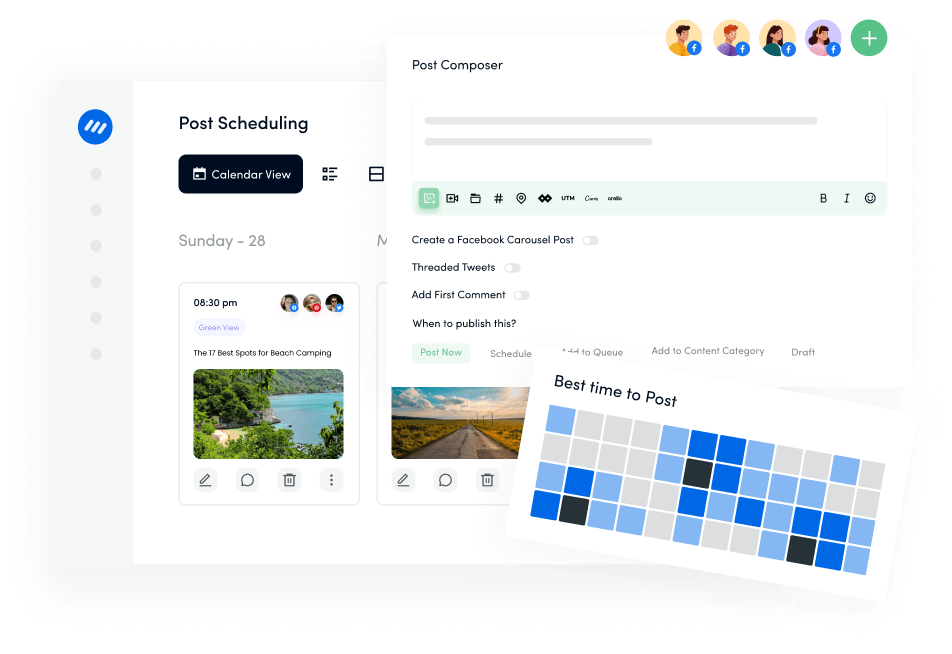
Understanding the need for multiple Facebook accounts
Creating multiple Facebook accounts isn’t odd, especially if you have various roles to play or want to juggle multiple positions effectively.
There are several reasons why a lot of Facebook users create separate Facebook accounts. To understand the need for creating multiple Facebook accounts, we need to dig into the reasons for doing so:
Reasons for having multiple Facebook accounts:
Let’s take a look:
1. Keep professional and personal lives separate

There is no harm in keeping your professional and personal lives separate. In fact, it’s mandatory in some cases where companies have strict policies regarding their employees’ use of social media.
Most companies don’t care much about employees’ personal Facebook profiles, and employees don’t mention their companies’ names in the workplace section.
Above all, many employees might not be interested in showing off their personal lives to their colleagues, higher management, or clients. This is why keeping professional and personal lives separate is important, and creating multiple Facebook accounts is the way to go.
2. Manage Facebook pages or ads for clients

Digital marketers, social media experts, and VAs often manage their clients’ social media accounts and pages. It’s probably best to create multiple accounts to keep personal and client work separate.
Moreover, some social media experts create multiple Facebook accounts to offer different services, such as designing social media posts or writing content.
On the other hand, some Facebook experts use their main account to interact with clients and the second account to run Facebook ads to manage social media marketing campaigns easily.
Therefore, creating multiple Facebook accounts to manage various social media clients seems inevitable.
3. To have a backup Facebook account for emergencies

Creating multiple Facebook accounts comes in handy when your main Facebook account goes down. Sometimes, the Facebook account gets banned or the Facebook ad account gets terminated.
You may have seen Instagrammers create their second accounts and cross-promote those just in case. The reason is exactly what we’re talking about at this point: They want to have a backup account up and running in times like these.
So, one of the reasons for creating multiple Facebook accounts is to prepare backup Facebook accounts for emergencies.
4. Spy on the competitors’ marketing strategies

Competitor brands compete with each other in the SERP as well as on social media platforms. What they also do is keep a close eye on the competition to spy on their strategies, tactics, and marketing plans.
However, this social media spying doesn’t happen from the official social media accounts. Instead, the team members create random profiles with little to no information about the person or workplace just to spy on their competitors.
5. Stay off the radar of some people

A lot of companies prohibit employees from using social media at the workplace or even after office hours. This leaves employees with no choice but to create a different Facebook or Twitter profile to stay off the radar. They don’t use their real name or picture to avoid any trouble. As a result, the presence on social media goes unnoticed.
These are some of the reasons why multiple Facebook accounts are useful for social media users who want to stay connected with friends and family without messing up their day job.
How ContentStudio helps manage multiple Facebook accounts
ContentStudio is an excellent social media management dashboard that helps brands, agencies, and marketers with social media publishing, social scheduling, content calendars, team collaborations, approval workflows, and social analytics.
Not only does it allow users to publish (or schedule) social media content on Facebook, but it also assists users publish content across all major social media platforms, such as YouTube, Pinterest, Twitter, Instagram, TikTok, and Threads.
The question arises here is that how ContentStudio helps in managing multiple Facebook accounts. First things first, ContentStudio supports both Facebook groups and pages when it comes to publishing/scheduling content.
It’s worth noticing that ContentStudio users can create multiple Workspaces depending on their pricing plans. It ensures that users can manage Facebook pages and groups for multiple brands through their relevant Workspaces.
A step-by-step guide to posting on Facebook using ContentStudio
Here are the steps involved in the process:
Step #1: Sign up and log in
To get started with ContentStudio, you need to sign up for an account. You can try it for free – it has a 14-day free trial.

Once signed up, log in to your account and you’ll see the dashboard.
Step #2: Create a Workspace
It’s vital to create a Workspace before getting started with ContentStudio, especially if you’re managing multiple social media for multiple clients or brands.
So, look out for the Workspaces option on the top left of the dashboard.
Open the drop-down menu and click on Add New to create your first Workspace in ContentStudio.
Fill out the necessary details and head over to the dashboard.
Step #3: Integrate Facebook group or page
Now, you need to connect your Facebook group or page with ContentStudio to be able to post or schedule Facebook content via ContentStudio.
Head over to the dashboard area and click on the profile icon in the top right corner. A drop-down menu would appear.

Go to the Social Accounts section and you’ll see the list of available social media channels.

Scroll down to Facebook; choose a group or page to connect your Facebook property and allow ContentStudio to access your Facebook details to complete the integration.
Step #4: Compose your Facebook post to publish/schedule
Once the integration is completed, go to the Compose option from the top menu and select Social Post to compose your Facebook post.

Now you’ll see the Post Composer page. Prepare your Facebook post to publish or schedule and don’t forget to select the Facebook platform from the left menu.
Hit the publish or schedule button depending on the type of post you’re creating and voila!
Step #5: Analyze your Facebook posts performance
Give your Facebook posts some time before start analyzing their performance.
To analyze the Facebook posts, go to the Analyze section and select the Facebook platform.

Dive deep into your Facebook content analytics to see how your Facebook content has performed over the past few days or weeks.
Essential elements of managing multiple Facebook properties with ContentStudio
Let’s take a look at some key points of managing multiple Facebook properties when using ContentStudio:
- Centralized dashboard for multiple Facebook accounts
ContentStudio is a one-stop shop for managing social media management, publishing, and analysis. It ensures that users manage multiple Facebook properties under one umbrella. Each Workspace allows users to add a Facebook page and group. The user can switch to a different Workspace for managing other Facebook pages or groups.
- Scheduling posts across multiple Facebook accounts
This powerful social media management dashboard paves the way for scheduling Facebook posts across multiple pages and groups using the power of ContentStudio. All users have to do is create separate workspaces for clients or brands when scheduling posts for multiple Facebook properties.
- Content calendar is helpful for visual planning
Content calendar is yet another useful feature of ContentStudio that helps users go through the scheduled or published posts in the calendar format. It gives users a bird-eye view of the social media content publishing plan. Users can switch to the respective Workspace when they want to use the content calendar to look through the scheduled or published Facebook posts for the Facebook property in question.
- Adding team members makes collaboration possible
Managing multiple Facebook accounts can be challenging. Therefore, team collaboration comes into play. ContentStudio permits Super admins to add team members to their ContentStudio account and delegate some tasks to help publish social media content with ease.
- Integration feature allows flawless connectivity with third-party tools
One of the aspects of managing multiple Facebook pages and groups is that the user might need a wide range of tools to integrate to ensure a smooth and effective flow of social media content across different platforms. The good news is that ContentStudio seamlessly connects with several third-party tools to make social media marketing easier and more effective than ever.
- Analytics and performance tracking for each account
Monitoring social media statistics is as important as regularly publishing new, fresh content. ContentStudio offers an inside-out reporting on social media content performance.
So, these are some of the important elements to know when managing multiple Facebook groups or pages using ContentStudio.
Best practices for managing multiple Facebook accounts
Growing Facebook pages, groups, or profiles requires some serious effort. All this would not be possible without understanding the fundamentals of the Facebook platform. Therefore, understanding best practices for managing multiple Facebook accounts, pages, and groups is crucial to skyrocketing growth.
Here are nine best practices for managing multiple Facebook properties every digital marketer and social media expert should know:
Establish clear objectives for each account

It’s essential to define clear objectives for each Facebook account or page, especially when managing multiple Facebook entities. Otherwise, one might be putting out content on Facebook that won’t help the brand grow on the platform.
It doesn’t matter that it’s personal, business, or a creator page, setting clear and distinct goals ensures focus and consistency in the Facebook content creation. Once this stepping stone is laid properly, the rest of the process gets easier.
Build a Facebook content strategy

While establishing a clear objective for the Facebook account helps determine a sense of direction for the content creator, it’s also necessary to create an individual content strategy for the entity, whether it’s a Facebook page, group, or profile.
A clear roadmap leads to clarity that helps in tailoring posts, interactions, and campaigns to align with the specific needs of the account.
Schedule Facebook posts in advance

To bring consistency to Facebook publishing, there might be several essential aspects. One of the important aspects that ensure smooth and effective Facebook content publishing is Facebook post scheduling.
Facebook does have a native scheduler that allows page and group admins to schedule posts in advance. However, don’t hesitate to utilize social media scheduling tools, such as ContentStudio. Not only does it ensure consistent Facebook publishing, but it also allows users to save the time and effort of showing up daily on the platform just to publish a post.
Keep consistent branding throughout

Even though each account may serve different purposes, maintaining consistent branding across all your Facebook avenues, such as profiles, pages, and groups is incredibly important.
Ensure that the social media team is using the same color schemes, logos, and tone of voice across all social media channels. Consistent branding helps reinforce the brand’s identity and reputation, which makes it easier for followers to recognize content across different platforms.
Monitor Facebook analytics regularly

Don’t shy away from checking Facebook analytics regardless of the audience size. Regularly reviewing analytics for each account (whether it’s a page or group) helps the admin understand what content resonates best with the audience.
Facebook Insights provides detailed information on some key metrics, such as engagement, reach, and audience demographics. Closely monitor these metrics and adjust content strategy accordingly, ensuring that each account performs optimally.
Set appropriate Facebook account security measures

One of the best practices for managing Facebook properties is to keep a strict check-and-balance on Facebook account security. The admin must ensure that each account has a strong, unique password and that two-factor authentication is enabled.
Regularly review and update security settings and stay vigilant about any malicious or unwanted accessibility to Facebook accounts. It massively minimizes the risk of unauthorized access and protects Facebook accounts from potential hacking.
Delegate Facebook publishing responsibilities appropriately

Social media management is teamwork. If you’re managing Facebook accounts for a business or organization, delegating some responsibilities to sub-ordinates can make the process more efficient.
Assign different team members to manage specific tasks within the team and keep an eye on the processes. Facebook allows you to assign different roles, such as admin, editor, or moderator, giving you control over who can post, manage ads, or view insights – utilize these roles and moderation settings to keep the control in your hands.
Use Facebook Business Manager for organization

Facebook Business Manager is a powerful management tool that allows you to manage multiple pages and ad accounts in one place. It helps keep personal and business accounts separate, reducing the risk of posting on the wrong account.
This centralized management system also provides easier access to insights, ads, and user roles, ensuring a smooth workflow.
These are some of the best practices every social media manager or VA should know when managing Facebook groups and pages for clients.
Plan, schedule, share, and analyze content for 15+ social media channels.
Try ContentStudio for FREE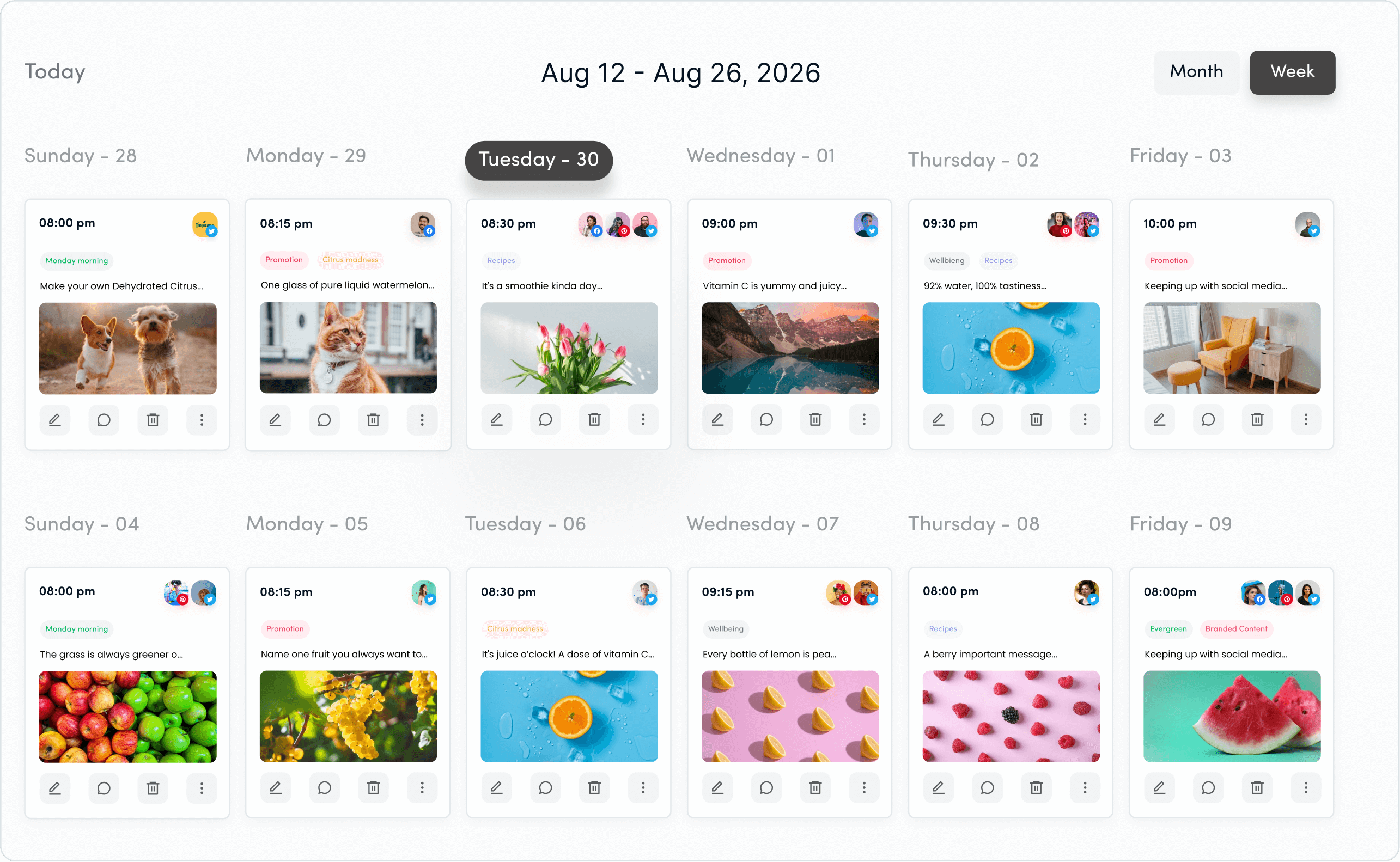
Conclusion
Managing a single Facebook page or group is quite a job, let alone multiple pages, groups, or accounts. The idea behind writing this article was to discuss this topic, put forth some solutions, and share best practices for managing multiple Facebook properties.
It’s quite evident that managing multiple social media accounts isn’t possible without a powerful social media management tool that offers scheduling, automation, collaboration, and analytics.
When some lesser-important tasks are on autopilot, the social media team can focus on the key areas, such as social listening, audience engagement, and analyzing statistics to create better, thought-provoking social media content.
ContentStudio is a state-of-the-art social media management dashboard that saves social media users time, energy, and money – Check out the 14-day free trial; no credit card is required.
FAQs about managing multiple Facebook accounts
Let’s take a look at the commonly asked questions:
Can I manage multiple Facebook accounts?
You sure can. All you need is to build a system where you can create, publish/schedule, and analyze Facebook content. ContentStudio allows users to manage multiple Facebook pages and groups across different Facebook accounts.
Can you have multiple Facebook business manager accounts?
It’s been learned that users can create two Facebook business manager accounts per profile. However, a Facebook user revealed in a video that she has been able to create up to 5 business manager accounts.
How to log in to multiple Facebook accounts?
When you’re logged in to your Facebook account, tap your profile icon on the top right and a drop-down menu will appear. You can see all the profiles including pages; choose the one you want to access. You can switch to a different profile or use Facebook as a page.
How many pages can I create with one Facebook account?
There is no limit on the number of pages a user can create or manage with one Facebook account.
Can two people run a Facebook page?
The admin can add other admins and managers to a Facebook page. Be advised about adding a new admin because the new admin would have the same access as the old one, meaning the second admin can remove the first admin from the page administration.
Can I create multiple groups on Facebook?
Yes, you can create multiple groups on Facebook. However, keep in mind that Facebook allows every user to be a member of up to 300 groups.
Recommended for you
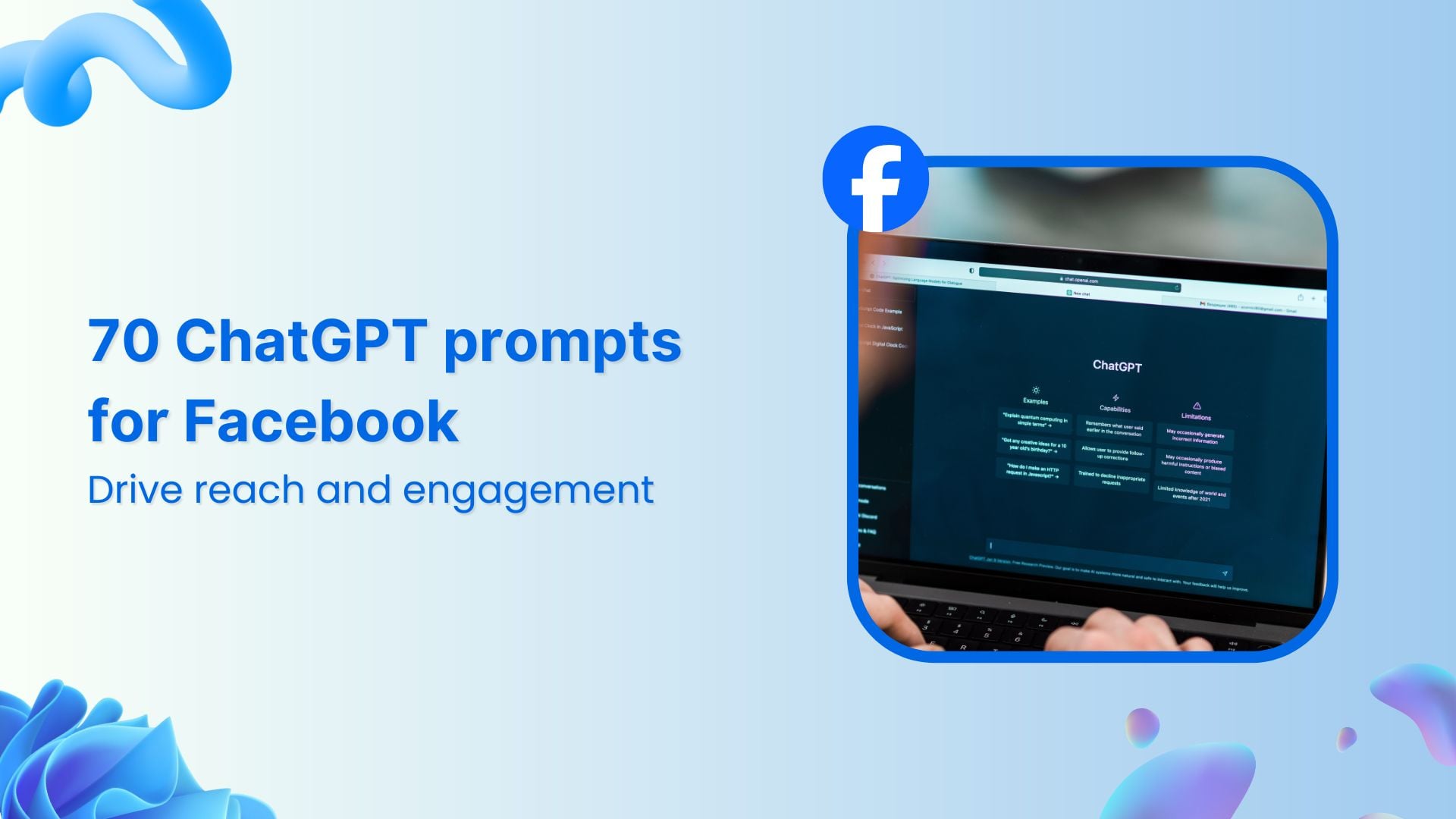
70 ChatGPT prompts for Facebook to drive reach and engagement


Powerful social media management software
14-day free trial - No credit card required.
